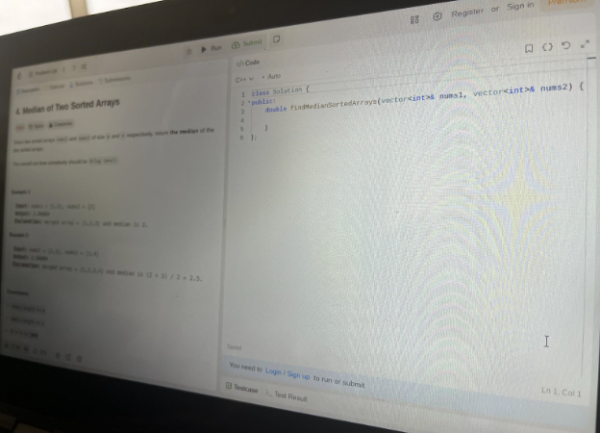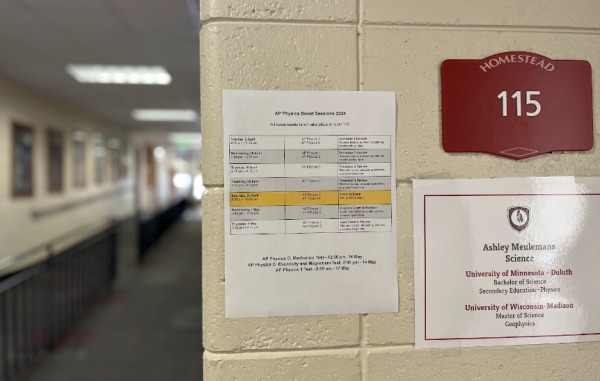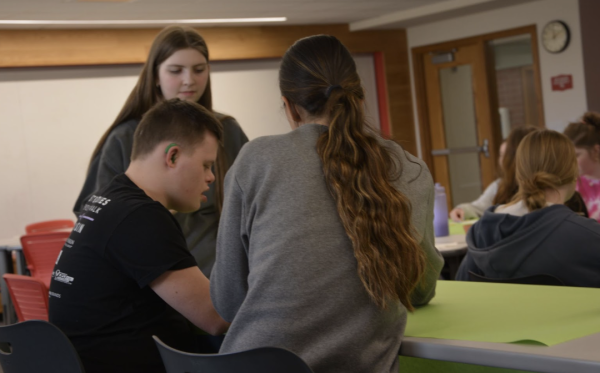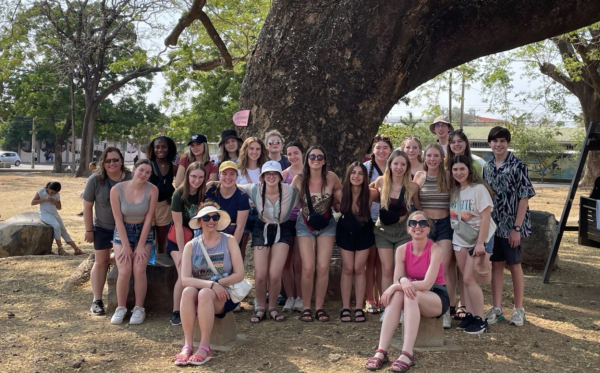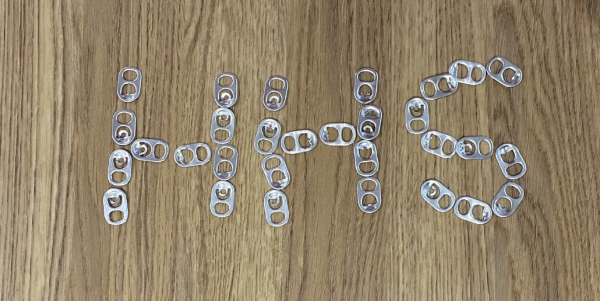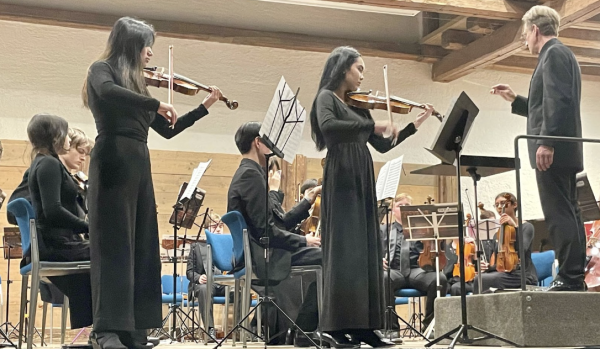Homestead Hangs Up: Controversial new phone policy to restrict student phone usage during class
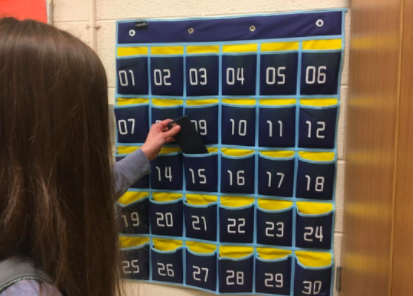
Margaret Mackinnon, freshman, puts her phone in the new pocket pouch that is just starting to be hung up in classrooms throughout the school.
Homestead students may find their monthly data usage dramatically down when a widely debated new approach at regulating cell phones goes into effect.
According to Principal Brett Bowers, the administration is looking to implement the policy change at the start of the third trimester, but there is no solidified date. Bowers stressed that when the administration gets ready to enforce the new rules, there will be an explanatory video for students.
The new approach will encourage students to place their phones in a phone pouch at the front of the room prior to the beginning of class. It is similar to the policy that is already in place in a number of classrooms throughout the school.
While students will be expected to keep their cellphones in the front of the class, Bowers assures no student will be searched to determine whether a cell phone is on their person rather than in their pocket or backpack as will be mandated.
If a student is seen using a phone during the class period at any time, the phone will automatically be sent to the office, and the student will have to retrieve it at the end of the day along with a consequence. The students will not be able to access their phone in the classroom unless there is an agreement between the student and teacher that it has an educational purpose.
What Bowers described as probably the biggest challenge is that the no-cell-phone policy involves monitoring student activity during classes in the hallways as well.
“This extends to hallways. So if you are out during a class period in a hall, and … an adult sees you with that cell phone, they are going ask you for that phone,” Bowers said.
Phones will not be taken away during nonregulated times, such as lunch period, study halls, before or after school, and during passing periods.
Consequences for not meeting the standards will result in an after-school detention for the first time, two detentions for the second offense, and if the problem continues, offenders will receive a half-day, in-school suspension.
“If there is a really, really, unique and extenuating circumstance [such as a family emergency] then a parent needs to communicate with the school’s assistant principal and say ‘here’s the situation, is it all right if my son or daughter keeps their cell phone on them because we may have to send this text about something.’ That is something that would absolutely need to be an agreement sanctioned by the administration. This should not be a conversation that exists solely between a parent and a student. [If it was] then we would say, that’s a violation of the school rule. If there is an exception to be made, then it would be [made] with administrative permission,” Bowers said.
Mr. Ernest Millard, a world studies teacher at Homestead, said, “The teachers have talked about it a lot, and the consensus is that cell phones are distracting kids so much that they can’t get the things done that they need to.”
According to a Pew Research Center study in 2015, 73% of teens have access to a smart phone and 15% have a access to a regular cell phone.
The new policy has been under discussion for months. Following the rumored announcement of the new phone policy, an informal survey was conducted of 113 Homestead students from all grades. Of the apps used during the course of the school day, including non-regulated times, 15.1% of student used either no apps or only school-related apps, while 76.1% admitted to using social media and 8.9% admitted to playing games.
The American Psychological Association acknowledges that you can be addicted to the internet. According to a 2013 study, titled “The Impact of Mobile Phone Usage on Student Learning,” students not using cell phones “wrote down 62% more information in their notes, took more detailed notes, were able to recall more detailed information from the lecture, and scored a full letter grade and a half higher on a multiple choice test.”
Homestead parents’ thoughts on the new policy fell on both sides. Millard, who has a child enrolled at Homestead, said he’s “100%t in agreement” with the new policy.
“My parents never got in touch with me when I was in school unless something was important and then I got a note through the counseling office,” Millard said.
Ms. Christine Burke-Duecker, parent of two freshmen students at Homestead, acknowledges that times have changed, but stated she still has a serious problem with kids not being able to communicate from the classroom with their parents. Burke-Duecker recalls a prior experience with a cell phone where her daughter was in a classroom and the situation felt threatening and unsafe.
“The students couldn’t get up and leave, and there was no other adult available. [My daughter and another child] were able to communicate that concern to me and to one other parent, and I was able to contact another adult in the school, particularly the principal and the vice principal, and they were able to go into the school room and intervene,” Burke-Duecker. said. “Phones are the only link we have to our kids at school. I recognize that previously we have never had those kinds of access to our kids when they were at school…and parents are going to pooh-pooh that; however, the threats that are being presented to our children at school now were also never present in the past. And those threats are real and we hear about them all the time. I think if the schools are having trouble policing the kids with their phones, then they need to find another way to resolve that problem for themselves.”
Student’s thoughts on the new policy are nearly unanimous. Ellie Doerr, freshman, is wholeheartedly opposed to the limits. She also brought up the need to contact her parents in that case of an intruder.
Doerr, who claims not to abuse the current phone privileges, said, “Some students don’t use their phones very often or don’t abuse them. Other students do. So now, everyone is getting punished for something that only some students do. I think they should take away these students’ phones and not take away everyone’s.”
Only time will tell how this controversial new policy will affect student involvement and grades in the classroom.

Caroline Downey is a freshman, and this is her first year on the Homestead Publications staff. She is involved in several different activities, such...


